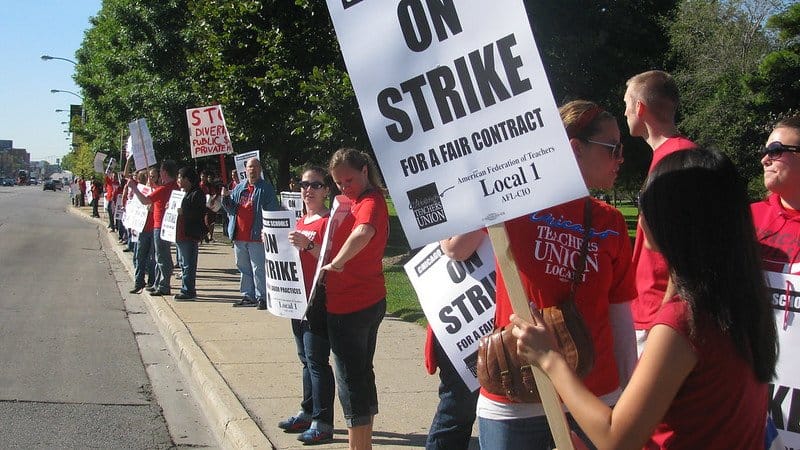Annie Hollister is an Honors Attorney at the U.S. Department of Labor and an alumna of Harvard Law School.
Fifteen days into the Chicago Teachers Union strike (which we have covered elsewhere), delegates for the union say they have reached a tentative agreement with Chicago Mayor Lori Lightfoot. The agreement includes a commitment to enforceable class size caps and a guarantee to have a nurse and social worker in every Chicago public school. Although union representatives say they are mostly happy with the agreement, they have not called an end to the strike. As of the time of writing, the city had not agreed to add makeup days to the school year to compensate for instructional time and worker pay lost due to the strike. The union has indicated that the strike will continue until the district agrees to add ten makeup days to the school calendar.
Journalists in NBC’s digital news division have announced that they plan to form a union. In a letter to NBC managers, employees expressed a hope that the protection of a union would allow workers to criticize the network without fear of retaliation. The decision to announce a union drive comes shortly after the publication of Ronan Farrow’s book Catch and Kill, which documents NBC’s extensive efforts to cover up accusations of workplace harassment and sexual assault. Workers expressed a desire to address the network’s “opaque” procedures for addressing allegations of sexual predation. The letter to management also said that organizers hoped that a union would help to eliminate pay disparities and improve job security. The workers are seeking to be represented by NewsGuild of New York.
On Wednesday, journalists and content producers at WHYY, Philadelphia’s public radio station, voted to join a union. In an election overseen by the NLRB, employees of the NPR affiliate elected to be represented by SAG-AFTRA, which also represents staff members at NPR’s national headquarters in Washington, DC. According to the union, 99% of the ninety-person bargaining unit voted to unionize. WHYY management announced earlier this month that it would not voluntarily recognize the union. Ever the broadcaster, WHYY has included both that decision, and Wednesday’s election, in its news coverage.
Tech companies have launched a bid to partially repeal California’s AB5 bill via statewide referendum. The bill, which we have followed closely, classifies as employees all workers who perform duties that fall in a company’s “usual course of business.” On Tuesday, Uber, Lyft, and DoorDash introduced a ballot measure that would classify “app-based drivers” as independent contractors, so long as those drivers receive minimum pay, workplace-injury insurance, and healthcare subsidies. The three employers behind the proposal have pledged to spend a total of $90 million to guarantee the measure a place on the November ballot, and they expect other app-based companies to join in the effort. On Tuesday, a spokesman for the tech companies said that the businesses intend to “spend what it takes to win.”
For Vice, Rachel Cohen profiles the Harvard Graduate Students Union-UAW’s efforts to negotiate a collective bargaining agreement with Harvard University. As Tabatha wrote earlier this week, members of HGSU-UAW* have voted to authorize the union’s bargaining committee to call a strike. The Vice profile, which includes an extensive feature of OnLabor’s own Rachel Sandalow-Ash, frames the negotiations between union and university as “the opportunity to negotiate a gold-standard contract or risk inviting something resembling class war on campus.” A spokesman for Harvard maintains that the university continues to bargain in good faith.
Happy Halloween!
*I, like many OnLabor contributors, am a member of the HGSU-UAW bargaining unit.






Daily News & Commentary
Start your day with our roundup of the latest labor developments. See all
June 30
Antidiscrimination scholars question McDonnell Douglas, George Washington University Hospital bargained in bad faith, and NY regulators defend LPA dispensary law.
June 29
In today’s news and commentary, Trump v. CASA restricts nationwide injunctions, a preliminary injunction continues to stop DOL from shutting down Job Corps, and the minimum wage is set to rise in multiple cities and states. On Friday, the Supreme Court held in Trump v. CASA that universal injunctions “likely exceed the equitable authority that […]
June 27
Labor's role in Zohran Mamdani's victory; DHS funding amendment aims to expand guest worker programs; COSELL submission deadline rapidly approaching
June 26
A district judge issues a preliminary injunction blocking agencies from implementing Trump’s executive order eliminating collective bargaining for federal workers; workers organize for the reinstatement of two doctors who were put on administrative leave after union activity; and Lamont vetoes unemployment benefits for striking workers.
June 25
Some circuits show less deference to NLRB; 3d Cir. affirms return to broader concerted activity definition; changes to federal workforce excluded from One Big Beautiful Bill.
June 24
In today’s news and commentary, the DOL proposes new wage and hour rules, Ford warns of EV battery manufacturing trouble, and California reaches an agreement to delay an in-person work mandate for state employees. The Trump Administration’s Department of Labor has advanced a series of proposals to update federal wage and hour rules. First, the […]